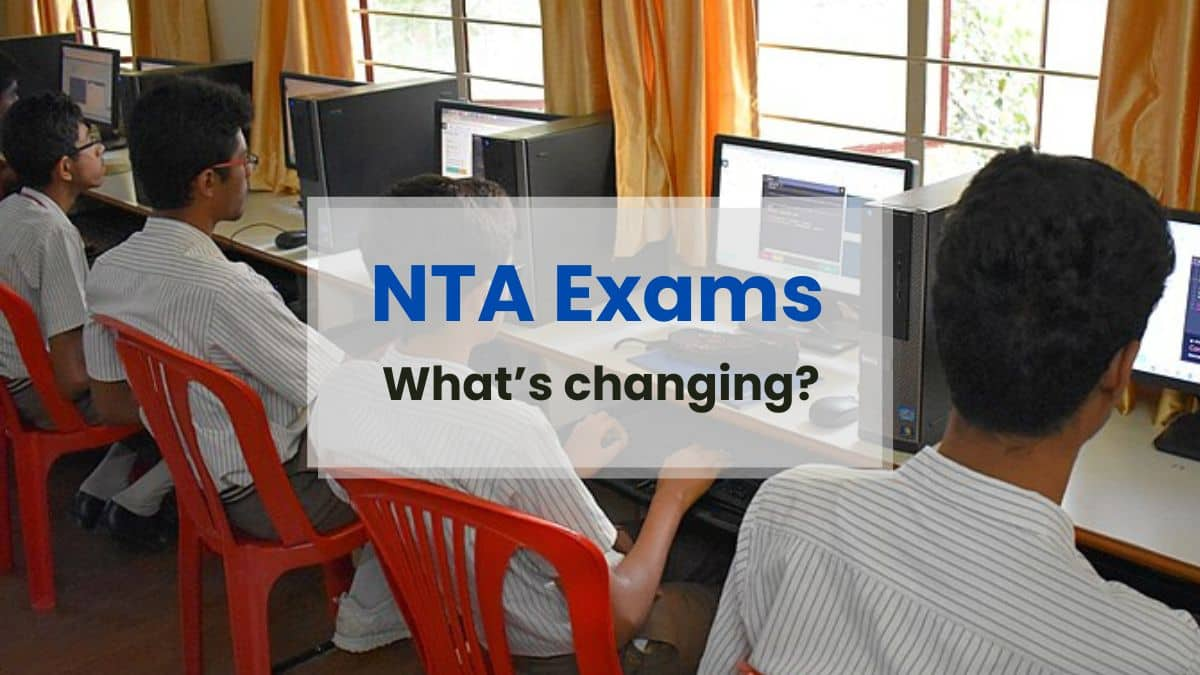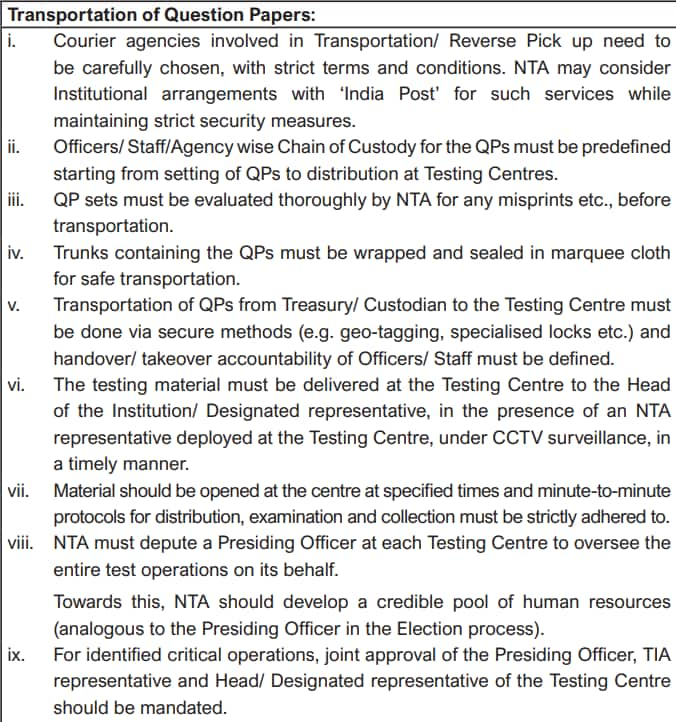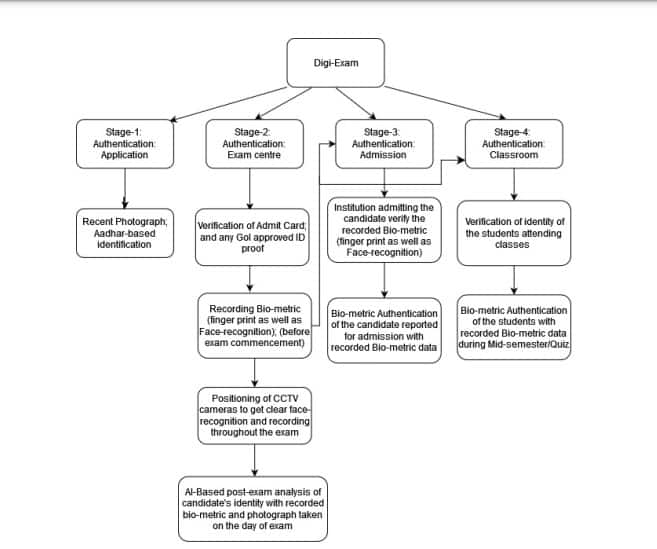NTA Exam Changes Live: Reforms in NEET UG, JEE Main, CUET; test centres, question papers, biometric data
Vagisha Kaushik | December 17, 2024 | 07:32 PM IST | 11 mins read
Multi-stage NEET exam, a more 'rationalised' CUET UG, more robust security, network of CBT exam centres in schools and universities and a restructuring of the National Testing Agency are among suggestions of expert panel on NTA exam reforms.
JEE Main 2026 College Predictor
Discover your college admission chances with the JEE Main 2026 College Predictor. Explore NITs, IIITs, CFTIs and other institutes based on your percentile, rank, and details.
Try Now
NEW DELHI: The National Testing Agency (NTA) will be conducting only national entrance examinations, such as JEE Main, NEET, and CUET, starting from the 2025 session. While the CUET exam will be held once a year, the NEET UG and other exams of that scale may be administered in multiple sessions. The High-Level Committee of Experts on the NTA has recommended changes in practically every aspect of NTA exams, the report of which has been made public today.
JEE Main 2026: Result OUT; Check Now | Final Answer Key Link
JEE Main 2026 Tools: College Predictor
JEE Main 2026: Session 2 Registration Link | Foreign Universities in India
For the National Eligibility Entrance Test (NEET UG), the committee has proposed a hybrid model, multiple-stage exam, and fewer attempts. The experts suggested putting a limit on outsourcing and contract-based services and recommended NTA to increase the number of centres.
The Common University Entrance Test (CUET) will be held in CBT mode, with a shorter duration and less number of subjects, as per recommendations of the University Grants Commission (UGC). For CUET UG 2025, students will be allowed to write only five subjects. The NTA High Level Committee has recommended major changes in the way NTA exam question papers are set, distributed and collected and proposed a biometric 'DIGI-Exam' system to prevent exam impersonation as measure to secure the exams. Apart from these, it has suggested expansion and major restructuring of the NTA itself to ensure smoother operation.
The Ministry of Education constituted a high-level committee headed by the former chairman of Indian Space Research Organisation (ISRO) K Radhakrishnan, to review the functioning of NTA and suggest exam reforms, following the NEET UG paper leak and exam cancellations. The panel comprises Randeep Guleria, B J Rao, Ramamurthy K, Pankaj Bansal, Aditya Mittal and Govind Jaiswal.
Follow us for the latest education news on colleges and universities, admission, courses, exams, research, education policies, study abroad and more..
To get in touch, write to us at news@careers360.com.
NTA Exam Reforms: Changes in JEE Main, NEET, CUET exams. Updates on number of attempts, test centres, subjects, age limit, mode of exam, and more. Here's what's changing in the exams and the National Testing Agency itself.
December 17, 2024 | 07:32 PM IST
NTA Exam Changes: Secure test centres, biometrics,
The high-level committee of experts on NTA exam reforms has suggested the National Testing Agency to develop 1,000 secure test centres, collect biometric data of examinees, and make frequent changes in exam pattern.
December 17, 2024 | 06:57 PM IST
Mobile test centres for JEE, NEET, CUET: HLCE report
The high-level committee recommends 'mobile testing centres' to facilitate the candidates from rural, remote, and thinly populated areas (for example North-East, Northern Himalayan States, Andaman Nicobar Islands). A typical large bus can accommodate 40-50 passengers, but for exams, it is designed to seat 30 test takers with ample space between seats. A fleet of five such buses, each equipped with 30 laptops, two servers, reliable power supply, and stable internet connectivity supported by booster antennae, can function as a test center for approximately 150 test takers. This setup is considered a Single Test Centre (STC) equivalent, functioning as an operational "Mobile Testing Centre."
December 17, 2024 | 06:36 PM IST
NTA Exam Panel Report: Development of 1,000 test centres
The National Testing Agency has been suggested to develop at least 1,000 examination centres in the country, in a phased manner. The location of the test centres should be feasible for candidates, well-connected by public transport, having sufficient space for comfortable seating arrangements, and with uninterrupted power supply and technical support.
December 17, 2024 | 05:40 PM IST
NEET UG 2025: Measures to prevent breach
The high-level committee on NTA exam reforms has suggested measures, to prevent breach in NEET exam, on setting up of question papers, transportation, printing of papers, and more. The medical entrance exam held on May 5 this year was leaked at a centre while the question papers were being transferred from the bank to the exam centre on an e-rickshaw. In order to stop NEET paper leak through transportation, the panel recommended the following steps:
 NEET UG 2025: Suggestions to avoid breach.
NEET UG 2025: Suggestions to avoid breach.
December 17, 2024 | 05:25 PM IST
NEET UG, JEE Main, CUET questions paper distribution will change
Until a full transition to computer-based test (CBT) is possible, the NTA High-Level Commission has recommended "Computer-Assisted Secure PPT" or CPPT. For the candidate, the test will continue to be a pen-and-paper test but far more technology will be employed in the delivery of the paper to the candidates. Given below are the main points:
- Question papers will be encrypted and randomised for each candidate. The final hard-copies handed out will have their photograph and roll number printed on it.
- The NTA will have to organise and maintain high-speed printers for printing the question papers.
- Question papers will wbe send to the centre's server (like in the CBT mode)
- The printing will be at a "pre-identified local and secure control room". The printing will be in the presence of state administration, police, NIC officials, observers and the exam centre head.
- Question papers can be printed on the day of the exam, thus eliminating the need to transport them or store them in bank vaults, as has been the practice.
- OMR sheets can be printed with the question papers.
- After the exam, the OMR sheet can be scanned at the centre itself and the scans uploaded. This will rule out "the possibility of tampering with the OMRs en route to the NTA".
December 17, 2024 | 05:01 PM IST
NEET 2025 syllabus PDF by NTA
The NEET 2025 syllabus is decided and published by the National Medical Commission. It has been published today.
Read More | NEET syllabus 2025 out; NMC uploads subject-wise topics
December 17, 2024 | 04:53 PM IST
NTA Reforms: Preventing impersonation, biometric data
The HLCE has suggested employing a DIGI Yatra-like system, called DIGI-Exam, to prevent impersonation. The system will verify the identity of the exam taker at multiple levels. The report proposes that exam centres collect biometric data of candidates when they go to write the exams and then share that data with bodies like the NMC for verification. At the institute, after admission, there could be a surprise check as well. The chart below is from the report and explains the process.
 NTA Exams: Preventing impersonation via DIGI Exams (Image: HLCE report)
NTA Exams: Preventing impersonation via DIGI Exams (Image: HLCE report)
December 17, 2024 | 04:34 PM IST
NTA NEET 2025: What changes?
Multi-stage exams, security overhaul, changes in how NEET exam question papers are delivered and answers on the OMR sheets are recorded. Here's what exactly has been proposed by the NTA High-Level Committee and is being discussed with the NMC and health ministry.
Read More | What changes in NEET UG? Panel suggests multi-stage exam, security overhaul, simpler process
December 17, 2024 | 04:29 PM IST
NTA Exams Reforms: Structural changes
The K Radhakrishnan Committee has recommended a host of changes for the NTA itself. These include major changes in the staffing pattern and distribution of roles and responsibilities within the National Testing Agency. It has recommended that
- The Director General (DG-NTA) be assisted by two additional director generals and directors
- The governing body of the NTA have three sub-committees with each responsible for one of these: test audit, ethics and transparency; nomination and staff conditions; stakeholder relationships
The NTA as a whole will have 10 'verticals', including:
- Digital infrastructure, technology and products
- National-wise testing centre infrastructure
- Research and development
- Transparency and communication
- International collaboration
- Information security
- Test-security and real-time monitoring
- Vigilance and forensics
- Administration, HR and capacity building
- Finance and legal matters
It will also work with district-level committees.
December 17, 2024 | 04:19 PM IST
NEET UG 2025: NMC publishes syllabus
The NMC has published the NEET 2025 syllabus. While the link is available neither the National Medical Commission site, nor the link to the document itself is opening.
December 17, 2024 | 04:06 PM IST
CUET UG 2025 in NTA exams report
The CUET exam for the undergraduate level was held in hybrid mode this year but the University Grants Commission has already announced that CUET UG 2025 is moving to a complete CBT mode. That said, the Radhakrishnan committee also had recommendations for CUET. It suggested rationalising the number of subjects and that the NTA prepare "exam-specific" strategies to tackle each.
December 17, 2024 | 03:55 PM IST
National Entrance Exams: Shift to CBT mode, says NTA report
The High-Level Committee Report recommends shifting to the Computer-Based Test (CBT) mode from the Pen and Paper Test (PPT) mode. The advantages of CBT, as per the expert panel, are as follows:
- Any type of question that can be created in PPT can also be developed in CBT. However, the reverse is not true. For numerical questions, CBT allows answers in a pseudo-"continuous" form with defined precision, while PPT can only accommodate discrete integer-type responses.
- CBT enables the collection of various alphanumeric responses from candidates, whereas PPT can only record a limited set of specified answers on OMR sheets.
- In CBT, the length of questions, including graphics, diagrams, and tables, is not limited by available paper space. This offers more flexibility to create visually rich and conceptual questions, independent of language, and free from issues related to translation.
- The range of questions that can be asked in CBT is significantly broader than in PPT, owing to the advantages outlined in the second and third points.
December 17, 2024 | 03:52 PM IST
NTA Exam Reforms: Committee proposes shift to "computer adaptive testing"
The NTA High-Level Committee suggests 'fine-tuning' exams as per the learners' needs, use AI and technology to adapt the test to the learner's level.
December 17, 2024 | 03:46 PM IST
NTA Exams: College admission tests only, no recruitment
The panel has recommended that the NTA stick to only college admission tests and not hold recruitment exams until their capacity expands significantly.
December 17, 2024 | 03:42 PM IST
NTA NEET UG 2025: The views of students
Apart from experts in academic and testing, the High-Level Committee of Experts on the NTA consulted with NEET exam candidates from this year. The views of the following candidates will likely influence how NTA NEET UG 2025 is ultimately conducted:
- Ankita Sangwan
- Aman Chopda
- Anshul Pratap Singh
- Himanshu Dhamni
- Mandeep
- Pranav Kumar
- Shivam Girotiya
Apart from them, students were represented by only a single group, the RSS-affiliate, Akhil Bharatiya Vidyarthi Parishad (ABVP)
December 17, 2024 | 03:37 PM IST
NTA syllabus for NEET 2025: What we know so far
The NEET 2025 exam is still shrouded in a host of uncertainties related to processes and even the exam mode. Ministry of education, which manages the exam conducting body, NTA, is discussing recommendations related to NEET UG with the ministry of health and health education regulator, NMC. The official website, dates, exam bulletin, the NTA syllabus for NEET 2025 are all awaited and contingent on the outcomes of those discussions.
December 17, 2024 | 03:33 PM IST
NTA report on CUET UG: Divide subjects into groups, recommends HLCE report
According to a report on the changes in exams conducted by the National Testing Agency (NTA), the wide range of subject streams offered for CUET (Common University Entrance Test) admission may require restructuring. The current diversity of subject combinations has led to complexity in the examination process. To simplify this, it is suggested that these subjects be organized into related clusters or groups. This approach would make it easier for students to choose their preferred subjects, reduce confusion, and streamline the exam pattern. The rationalization is expected to enhance clarity and improve the overall efficiency of the admission process.
December 17, 2024 | 03:32 PM IST
NTA exams report not on official website
The High Level Committee report on the functioning of the National Testing Agency is not on the NTA official website but with the ministry of education.
December 17, 2024 | 03:29 PM IST
NEET UG 2025 Reforms: Discussion with NMC, health ministry
The education minister, while speaking to the press, said that the reforms in the NTA NEET UG 2025 are under discussion with the National Medical Commission (NMC) and the health ministry. The NTA conducts the NEET exam on behalf of the NMC which is the top regulator for medical education and the profession in the country.
December 17, 2024 | 03:22 PM IST
NTA Report on NEET UG: What is multi-stage testing?
The High Level Committee of Experts for the NTA exists because of the widespread allegations of paper leak in the NEET exam for MBBS admissions this year. The HLCE has recommended "multi-stage testing" for the NEET UG. Here's what that entails:
- The test spread over a few days to even a few weeks, if the number of participants exceeds a certain figure - the report cites 2 lakh as example.
- A normalisation process based on predetermined parameters and methodology that will be communicated in advance
"An acceptable framework with thresholds and test objectives of scoring/ranking at each state, and number of attempts etc. may be evolved," says the report.
Currently, the JEE Main is held in multiple sessions. The first session of JEE Main 2025 will be held in January 22, 2025.
December 17, 2024 | 03:22 PM IST
NEET UG in multiple stages
The high-level expert committee has also recommended conducting the National Eligibility Entrance Test (NEET UG) in multiple stages. Using multi-stage testing for NEET UG could be a feasible approach and should be explored further. A clear plan should be made, including score or rank limits for each stage, test objectives, and rules about how many attempts a candidate can have, as per the panel on NTA exam changes.
December 17, 2024 | 03:13 PM IST
NTA Exam Centres: Major changes
The High-Level Committee of Experts (HLCE) on the NTA, led by former ISRO chairman, K Radhakrishnan, has made a host of recommendations regarding exam centres for entrance tests such as NEET UG, CUET exam and the JEE Main. These include the following:
- NTA must build a network of CBT testing centres in centrally-run schools such as KVs and JNVs as well as universities and institutes. It must have a network of 500 such centres within 1 year.
- NTA must expand its network of CBT testing centres to ensure there's at least one in each district. Candidates must be allotted exam centres in their home districts to avoid a situation like an early edition of CUET UG when candidates had to travel to other states or even in Assam, this year.
- The NTA committee report also suggests setting up 1,000 'secure Standard Testing Centres' across the country on 'war footing'
- NTA must have "mobile testing centres" for rural students.
December 17, 2024 | 03:05 PM IST
NTA High Level Committee Report: JNVs, KVs, universities to have exam centres
The High-Level Committee Report on the National Testing Agency has recommended using infrastructure in Jawahar Navodaya Vidyalayas, Kendriya Vidyalayas, universities and institutes for exam centres. It says the NTA should build a network of such CBT exam centres within 1 year.
Read More | Use KVs, JNVs as NEET, JEE Main exam centres: High Level Committee on NTA
December 17, 2024 | 03:01 PM IST
NTA Exams: Number of exams halved in 2024
The number of exams the National Testing Agency conducts dropped to half the previous count in 2024; it was also the lowest since the first year it conducted exams. The K Radhakrishnan Committee has recommended that the NTA stop managing recruitment exams altogether from 2025 and stick to college entrance tests such as NEET UG 2025, JEE Main and others, plus the UGC NET.
Read More | National Testing Agency exam count dropped by over 50% in 2024; lowest in 5 years
December 17, 2024 | 02:55 PM IST
JEE Main, NEET: Use KV, JNV exam centres, suggests panel
The expert panel on NTA exam reforms has suggested using the test centres of Kendriya Vidyalayas (KVs) and Jawahar Navodaya Vidyalayas (JNVs) as examination centres for the national entrance exams such as the Joint Entrance Examination (JEE) Main, National Eligibility Entrance Test (NEET).
December 17, 2024 | 02:41 PM IST
NTA Exams Report: Changes in JEE Main, CUET, NEET
The National Testing Agency (NTA) will focus on major national entrance exams such as JEE Main, NEET, and CUET, as per a report of a high-level committee formed by the education ministry on functioning of NTA, following NEET UG paper leak and exam cancellations this year. NTA will not hold recruitment exams starting from 2025 session.